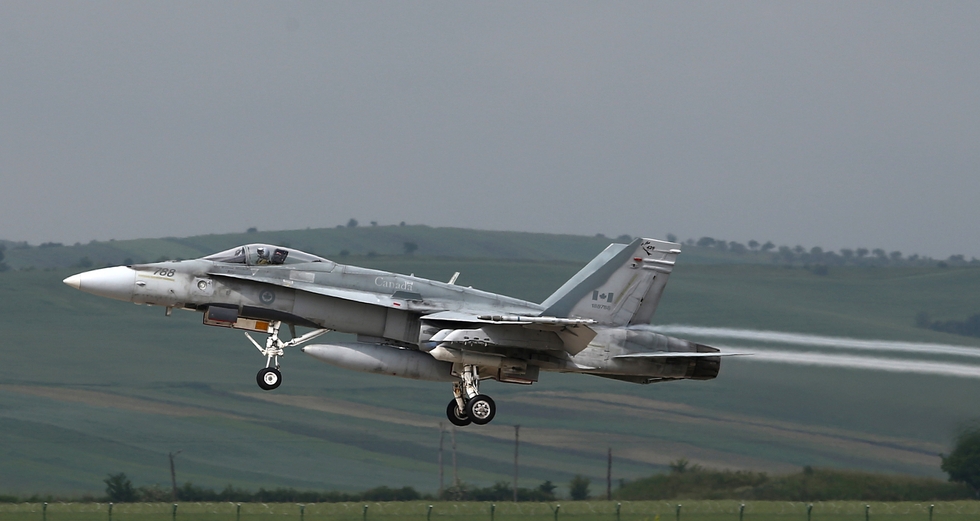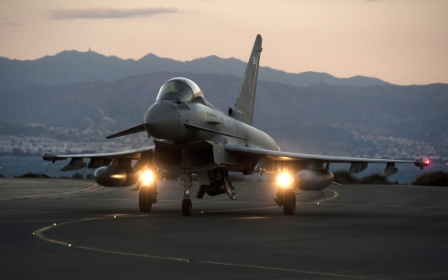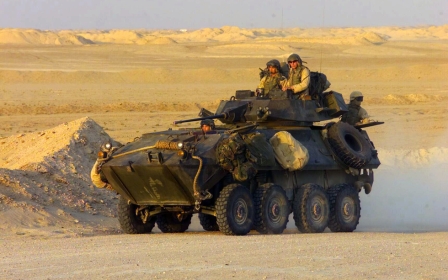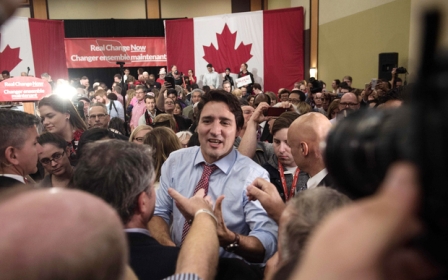Canada's changing mission in Iraq raises new questions

TORONTO, Canada – Justin Trudeau has fulfilled one of his most contentious election campaign promises, as Canadian military air strikes on Islamic State (IS) group targets in Iraq and Syria ceased in mid-February.
But Canada is still indirectly involved in the aerial campaign, and its focus on training Iraqi security forces in the fight against IS has raised new questions for Ottawa over how its mission will contribute to a long-term solution for war-ravaged Iraq.
“I’m very happy that the government has decided that there may be more productive things that they can focus on than bombing,” said Peggy Mason, president of the Rideau Institute, an independent research and advocacy group based in Ottawa.
“They’re indirectly continuing to participate in the air campaign, but at least they’re not directly participating and I think that’s an important step forward,” Mason told Middle East Eye.
An end to air strikes
Canada formally announced it had stopped all air strikes in Iraq and Syria on 15 February.
Between 30 October 2014 and 15 February 2016, Canadian fighter jets (CF-18s) made 1,378 sorties, which resulted in 251 air strikes (246 in Iraq and five in Syria), the government said on a website detailing each air strike.
Under the revised mission, Canadian aircraft will continue to assist the Middle East Stabilisation Force, the international coalition fighting IS, with air-to-air refuelling and aerial intelligence, surveillance and reconnaissance missions.
From 15-28 February, Canadian aircraft conducted another 388 sorties for refuelling, and 416 reconnaissance missions over Iraq.
Canada will also triple its mission to train, advise and assist Iraqi security forces fighting IS, which previously totalled about 69 Canadian special forces soldiers.
Canada “is focused primarily on training Kurdish forces in Northern Iraq,” Captain Kirk Sullivan, public affairs officer for Canadian Joint Operations Command Headquarters of the Canadian Armed Forces, told MEE in an email.
Canadian-led military training will include shooting, movement, communications, planning missions and effectively using weapons systems, Sullivan said.
“This war against ISIS cannot be won from the air. It has to be won on the ground. That is the exact reason why we are tripling the training mission and doubling our intelligence capacity as well,” Defence Minister Harjit Sajjan said in the House of Commons, using a different acronym for IS.
Kurdish forces accused of human rights violations
In late January, Amnesty International accused Peshmerga forces and Kurdish militias of bulldozing, blowing up and burning down thousands of homes in Arab villages in northern Iraq.
The attacks, apparently levied against Iraq’s Arab population as punishment for their alleged support for IS, may amount to war crimes, the human rights group said. Kurdish forces also reportedly prevented Arab residents from returning to their homes.
Though officials from the Kurdistan Regional Government (KRG) justified displacing Iraqi Arabs on security grounds, Amnesty reported that officials sought to firm up control over disputed areas that the KRG has long held as theirs.
A spokesperson for Global Affairs Canada said the Canadian authorities have engaged with Iraqi officials in Baghdad and Erbil over allegations that armed groups have perpetrated violence against civilians.
“We have asked Iraqi authorities to investigate these allegations and to take all necessary steps to ensure that civilians are protected,” Francois Lasalle told MEE in an email.
“Canada supports the Iraqi government’s efforts to reach out to the country’s various ethnic and religious groups to foster reconciliation.”
Renad Mansour, a fellow at the Carnegie Middle East Center specialised in Iraq, Iran and Kurdish affairs, said Canada needs to be mindful which groups it trains in Iraq.
“If you’re looking to train the Peshmerga for the fight in Mosul and other Arab-Sunni regions, you have to understand the Peshmerga will fight insofar as it’s in their interests. It will be a bit ugly if you’re using the Peshmerga to really try to liberate Anbar, Diyala and some of the Arab areas. There’s a lot of politics behind that,” Mansour told MEE.
If Canada wants to contribute towards a long-term solution in Iraq, Mansour said, it should work to strengthen Iraq’s weakened Department of Defence and support the central government in Baghdad, especially Prime Minister Haider al-Abadi’s efforts to regain the trust of the country’s Sunnis.
“First of all, understand who is there, what their grievances are, and then try and act in a way to kind of move past their grievances and rebuild trust,” he said. “Trust building is almost as important here as capacity building, if we’re talking more long-term.”
Debate needed over Canada’s role
The motion presented to the House of Commons about the Iraq mission stipulates that Canada will work to engage with political leaders in the Middle East in the aim of “finding political solutions” in the region.
“We are providing urgent humanitarian aid, assistance with long-term development, and governance assistance. We are promoting diversity and reconciliation and ensuring a strong presence in Iraq,” Foreign Affairs Minister Stephane Dion said.
And while Mason said these are encouraging sentiments, Canada has not elaborated on how it plans to aid Iraq establish good governance.
She said a focused national debate on these issues must take place to keep Ottawa accountable.
“The government has a lot on its plate,” she said, “and I think unless they’re pushed on this, unless there are good questions asked, and unless the commentators and the media really start asking these kinds of questions – instead of on and on and on about the bombing – they’re not under any pressure to follow-up.”
Middle East Eye propose une couverture et une analyse indépendantes et incomparables du Moyen-Orient, de l’Afrique du Nord et d’autres régions du monde. Pour en savoir plus sur la reprise de ce contenu et les frais qui s’appliquent, veuillez remplir ce formulaire [en anglais]. Pour en savoir plus sur MEE, cliquez ici [en anglais].




